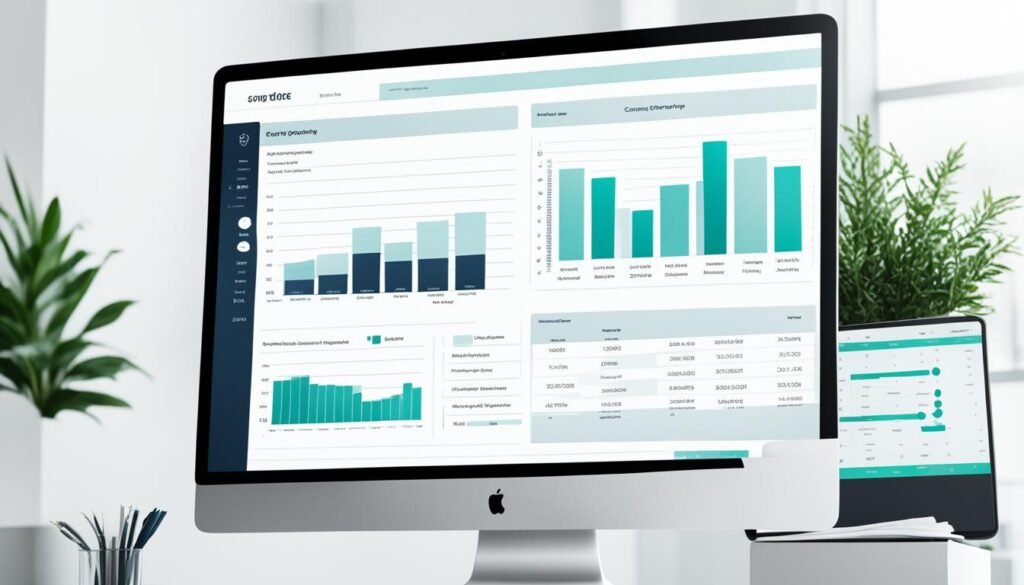Being a real estate agent, it’s not just about selling homes – you’re running a business. You need to keep a close eye on your finances1. Being self-employed means you’re in charge of tracking your income, expenses, and tax payments1. The good news is that good bookkeeping should keep you on track.
Proper bookkeeping is more than keeping you organized; it can save you taxation money and get you loans when needed. If you record your income and expenses throughout the year, you can take advantage of every deduction and chance of tax-savings. It gets overwhelming to run the business of real estate, so it is very important to have a professional manage the financial books.

Key Takeaways
- Real estate agents are considered self-employed for tax purposes
- Bookkeeping helps track income, expenses, and tax payments
- Proper bookkeeping can save you money on taxes and help you qualify for loans
- Keeping separate business and personal bank accounts is crucial
- Consult an accountant annually to stay up-to-date on tax laws
Importance of Bookkeeping for Real Estate Agents
Effective bookkeeping is key for real estate success2. Real estate agents should team up with an accountant for a solid business plan. This plan should cover many areas, like the company’s goals and how it will make money2. Companies with many employees might need a full-time bookkeeper to handle their finances2.
Effective bookkeeping is the key to success in real estate. As a real estate agent, they should combine efforts with an accountant for a strong business plan. This business plan should incorporate many aspects, such as the company’s mission and how it will be earning its revenue. A large number of employees within the company may require that a full-time bookkeeper be in charge of the finances.
Tracking Cash Flow
Real estate agents must be aware of cash flow. It is necessary to account for the money that is coming in and going out in order to prevent losses. In terms of income and expenses, it reveals which properties or ads are most effective.
Ensuring Tax Compliance
Good bookkeeping solves tax problems with IRS. You need to remember all your tax deductions and know how to process taxes. In general, clear chart of accounts makes tracking much easier.
Making Informed Business Decisions
Proper financial records are important in making smart business decisions. Regularly checking financial statements keeps you abreast of the health status of your business. Collaborating with a real-estate-knowledgeable CPA might be excellent as you may get an advice on tax and law. Strong real estate accounting software may help with easier and less error-prone bookkeeping.
“Bookkeeping is the foundation of a successful real estate business. It not only ensures compliance but also empowers you to make data-driven decisions that drive profitability.”
Cash Basis Accounting for Real Estate
For real estate pros, mastering cash basis accounting goes hand in hand with managing money well. Most landlords use this method since it is easy and helps in tracking money coming in and out. It’s the default in REI Hub accounts for investors, showing it’s very common.
Understanding the Cash Method
This method records income only upon receiving it and expenses only when you pay them5. As a landlord, you can use cash basis or accrual basis since both are options open to you in managing your finances depending upon what your business calls for5. It is excellent for real estate pros because it indicates in clear manner that your cash flow is accounted for5.
Advantages of Cash Basis Accounting
It concentrates on actual cash flows; therefore, it clearly shows how your money is moving about—in a perfect way for small real estate businesses. Moreover, the method is simple and easy to understand, besides offering tax benefits, hence placing it in the top category to be elected by rental owners. With this method, you will manage your rental money, get your taxes, and make wise business decisions.
“The cash-basis accounting method offers more granular control of taxable income within a specific period for real estate investors.”4
In simple terms, most real estate professionals prefer to use cash basis because it is easy, clear, and has tax benefits. You can manage your rental finances and make wise business decisions using this method.
Bookkeeping for real estate
Accurate bookkeeping for real estate lets one able to manage their money. Monitoring the sources of each rental income and expenditure will keep you updated about the real condition of your real estate business6.
Always include detailed information about any transactions so that it could be easy to track during an audit. With regards to rental income, indicate the tenant’s details, the date of payment, and how you were paid. For expenses, track down whom you paid and for how much and when.
Your real estate financial reporting gives you a full overview of your finances, including income statements and cash flow statements, among others. These reports become very crucial in making business decisions and help you pinpoint areas for improvement.
Elaborate bookkeeping for real estate will make tax time much easier for you, avoiding all possible fines and back taxes. Following the rules by keeping clean financial records means that you get the most deductions you can.

Technology can simplify one’s real estate bookkeeping. Tools such as QuickBooks can assist with real-time record keeping and reporting of transactions. They also provide an easy way for rental income tracking and expense tracking for properties, which allows for expansion in your business7.
Maintaining the bookkeeping of your real estate books will enable you to make informed decisions, follow the law, and be successful in your real estate investments8.
Tools and Methods for Real Estate Bookkeeping
As a real estate pro, having a strong bookkeeping system is key. It helps you manage your money well. You can use tools and methods like manual spreadsheets, generic accounting software, or real estate-specific software to keep track of your finances.
One of the important things a real estate professional must have in his or her business is an outstanding bookkeeping system. It allows you to deal with your money appropriately. You might be doing that using either tools or methods like manual spreadsheets, generic accounting software, or real estate-specific software to help you keep track of your finances.
Manual Spreadsheets – Not Reccommended
Although ome real estate experts use manual spreadsheets, such as Excel or Google Sheets, this simple method is extremely time-consuming and prone to errors. Manual data entry errors produce a lot of work to correct. They can also mess up your financial reports and tax filings.
Generic Accounting Software
Tha vast majority of real estate agents leverage generic accounting software, such as QuickBooks or Xero. These tools are efficient in that they offer an list of features pertaining to invoicing and expense tracking. However, certain real estate features might not be available.
Real Estate-Specific Software — Top 5 Real Estate Software Solutions for 2024
Another category of real estate professionals can utilize field-specific software for enhanced bookkeeping. For example, such programs would help in creating invoices for tenants and tacking their rent payments. They aid in property sales management and even depreciation estimation.
Consider the size and needs of your real estate business when deciding on a bookkeeping method. Good bookkeeping is all about automated systems, checking accounts in regular intervals, keeping business and personal funds separate, and most importantly making use of software efficiency.

“Accounting helps real estate agents understand their finances, manage cash flow, and keep an eye on expenses. It ensures timely payments, offers tax deductions, and makes tax returns easier.”10
#1 Buildium
Buildium is widely regarded as the best real estate software, offering a comprehensive suite of tools for property management. It caters to residential properties and is excellent for managing tenant and lease tracking, accounting, and maintenance requests.
Pros:
- User-friendly interface
- Robust accounting features
- Excellent customer support
Cons:
- – Higher price point for advanced features
User Feedback: Many users appreciate its intuitive design and comprehensive functionality. One user noted, “Buildium made managing my properties so much easier, especially with its accounting tools.”
Best For: Beginners and advanced users
Subscription: Offers a free trial and tiered pricing
#2 AppFolio Property Manager
AppFolio is another top contender, known for its powerful automation features. It provides tools for marketing, leasing, and accounting, making it a versatile choice for various property types.
Pros:
- Automation saves time
- Strong marketing tools
- Integrated with many third-party apps
Cons:
- Slight learning curve
- Higher cost
User Feedback: Users often praise its automation capabilities. “AppFolio’s automation features have been a game-changer for my business,” says a property manager.
Best For: Advanced users
Subscription: Offers a free demo, paid plans available
#3 Propertyware
Propertyware is ideal for single-family property management. It offers features like tenant screening, accounting, and maintenance management, tailored to the unique needs of single-family properties.
Pros:
- Customizable workflows
- Detailed reporting
- Good tenant screening tools
Cons:
- Complex setup
- Limited mobile app functionality
User Feedback: Users find it highly customizable but challenging to set up. One user commented, “Once you get the hang of it, Propertyware becomes indispensable.”
Best For: Intermediate to advanced users
Subscription: Offers a free trial and customizable plans
#4 RealPage
RealPage provides a robust solution for property management, particularly for larger portfolios. It includes features for accounting, leasing, and facilities management.
Pros:
- Comprehensive feature set
- Good for large portfolios
- Scalable
Cons:
- Expensive
- Can be complex
User Feedback: RealPage is praised for its scalability. A user stated, “RealPage has grown with my business, but it was a bit overwhelming at first.”
Best For: Advanced users with large portfolios
Subscription: No free version, paid plans
#5 Rentec Direct
Rentec Direct is a budget-friendly option that offers essential property management features. It’s suitable for smaller property managers looking for a cost-effective solution.
Pros:
- Affordable
- Easy to use
- Good customer support
Cons
- Limited advanced features
- Basic reporting
User Feedback: Users appreciate its simplicity and cost-effectiveness. “Rentec Direct is perfect for my small portfolio,” one user shared.
Best For: Beginners and small portfolio managers
Subscription: Offers a free trial and affordable paid plans
… So, what do we have?
You need comprehensive property management? Buildium is will help you stand out as the best universal solution, as it’s easy-to-use and provided with powerful features. You seek for advanced automation? Try AppFolio. You need more complex needs and larger portfolios? Choose between Propertyware and RealPage. Finally, for solid entry-level solution for smaller managers you can go with Rentec Direct. Proper tools along with methodologies they follow can facilitate and make the property management accounting of one’s finances easy.
Conclusion
For real estate business, bookkeeping is extremely important to the business. It accrues a number of benefits, including having freedom, legality, and earning more. Knowing the financiall state of your business can make differences in decisions and help one sleep well at night. A reliable bookkeeping system allows agents to manage their money more effeciently, make wise business decisions, and not cross the line of taxation laws.
You can defenetely go with spreadsheets, as it’s a regular accounting software, however you need to bear in ind that the real estate-specific software is what many people finally come up with for their in order to gain a success12. Most real estate agents earn 80-90% of their income from commissions12.
Proper real estate bookkeeping helps an investor in keeping up-to-date records of the rental income and costs. It can produce detailed financial reports and stay within the law. Property portfolio management and real estate investment analysis gives one the choices that grow and maximize the profit of your real estate business.
FAQ
What are the benefits of bookkeeping for real estate professionals?
What is the cash basis accounting method used by real estate professionals?
How should I record income and expenses in my real estate bookkeeping?
What types of bookkeeping tools and methods are available for real estate professionals?
Source Links
- Bookkeeping for Real Estate Agents: A Complete Guide – https://www.collective.com/blog/bookkeeping-guide-real-estate-agents
- Why Accounting For Real Estate Agents is So Important – Scrubbed – https://scrubbed.net/blog/why-accounting-for-real-estate-agents-is-so-important/
- Real Estate Accounting – 7 Things Agents NEED to Know (2024 Updated) – https://www.agentadvice.com/blog/real-estate-accounting/
- Why Rental Properties Mostly Use Cash-Basis Accounting (Rental Property Bookkeeping)- https://www.reihub.net/resources/why-rental-properties-use-cash-basis
- What Is Cash Basis Accounting — and Is It Better Than Accrual? – Azibo – https://www.azibo.com/blog/what-is-cash-basis-accounting
- Real Estate Accounting for Newbies | BiggerPockets Blog – https://www.biggerpockets.com/blog/organize-real-estate-bookkeeping
- A Clean Start: Bookkeeping for Real Estate – https://www.jmco.com/articles/real-estate/bookkeeping-for-real-estate/
- The Landlord’s Guide to Basic Real Estate Bookkeeping – https://www.stessa.com/blog/real-estate-bookkeeping/
- The 8 Best Real Estate Accounting Software Tools (2024 Updated!) – AgentAdvice.com – https://www.agentadvice.com/best-real-estate-accounting-software/
- Real Estate Accounting: A Complete Guide for 2024 – https://www.freshbooks.com/hub/accounting/accounting-for-real-estate-businesses
- Accounting for Real Estate Agents – Best Practices – https://therealestatetrainer.com/accounting-for-real-estate-agents-best-practices/
- Bookkeeping for Real Estate Agents: A Complete Guide – https://www.uplinq.com/blogs/the-complete-guide-to-bookkeeping-for-real-estate-agents
- Real Estate Bookkeeping Guide for Beginner Agents | CapForge – https://capforge.com/real-estate-bookkeeping-guide-for-beginner-agents/